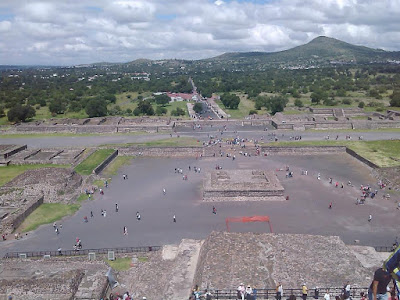Mexico – Pyramids of Teotihuacán
Teotihuacán was an
ancient pre-Hispanic city located approximately 25-30 miles from Mexico. The
city got its current name ‘Teotihuacán’ from the Aztec empire and translates to
‘birthplace of the Gods’. Teotihuacán is also the most visited archaeological UNESCO
world heritage site in Mexico. The moment I heard about these pyramids
from a few locals when I was on a work trip to Mexico City, there was no doubt
about my willingness to visit them for obvious reasons. I am a history buff,
specifically interested in the origination of modern day cities. The fact that
I had never visited a pyramid in my life before intrigued me further. When
I first heard about pyramids in Mexico, I was confused as the only concept of
pyramids I had known earlier were Egyptian. It took me a bit of reading to
figure out the concept of ‘Temple’ pyramids that Mexico had.
As we made our way
inside, we noticed vendors everywhere and each with his own aggressive
marketing strategy. Our driver cum tour guide seemed to have some information about
the history behind this place. He was also eavesdropping on the other tour
guides giving instructions to their groups in Spanish and translating it to
English for us. I don’t personally believe in hiring a guide at such historical
sites as I’ve noticed that every person has their own version of history to
tell. I read a few informative articles around the place before the trip and it
wasn’t a humongous task to connect the dots after going there.
Apparently, the city
of Teotihuacán was established around 100 BC and it used to be the largest city
in the pre-Columbian Americas. The ruins of many residential compounds exist
till date. I was surprised to find out that Teotihuacán had structures similar
to modern day apartments that were built to accommodate their large population
(of approximately 150000). However, the inception history of Teotihuacán is
quite mysterious, its founders, and the reason it collapsed are unknown.
The
most dominant civic architectures in this ancient city are the two large pyramids
‘Pyramide del sol’ (Pyramid of the sun) and ‘Pyramide del la Luna’ (Pyramid of
the Moon). The city also contains a massive central road called the ‘Avenue of
the dead’ which spans across the city and holds it together. It connects the
pyramid of sun, pyramid of moon and various other structures together. Both of
these pyramids have undergone archaeological excavations and restoration. Many
buildings are evidently half original, half restored.
The
highest construction in the complex is ‘pyramid of the sun’. We had to climb
243 steps to reach the top. The topmost peak of this pyramid is in perfect
synchronization with the axis where the sun sets every evening. Locals in
Mexico consider this a sacred spot. I could see many people praying,
meditating, soaking in the sun’s energy and making wishes. I did none of those
as I was busy soaking in the spectacular view of the entire city from the top
of the pyramid; and also because I am a restless soul. I find meditation next
to impossible. The 360 view from the top of the pyramids was amazing. I could
see the city, the country side and nearby pueblos.
Pyramid of the Sun
After
the pyramid of the sun, we walked along the avenue of the dead (not sure why
saying this makes me happy) to reach the pyramid of the moon. This pyramid has
a height of 135 feet. This pyramid was preceded by a sloping four body construction with murals on many them which looked beautiful. This pyramid also had the same structure
and stairs to reach the top, but since we were exhausted and it was a very
sunny day, we decided to curb our enthusiasm to leave us with some energy to go
around the remaining buildings in the site. Although the pyramid of the sun
clearly stands out because of its substantially large structure, the pyramid of
the moon is beautiful due to the number of beautiful small buildings and
structures that surround it.







Comments
Post a Comment